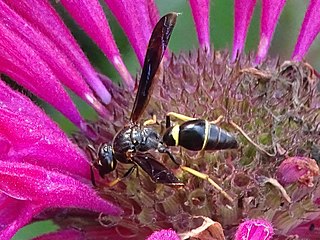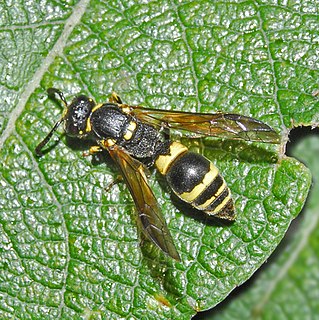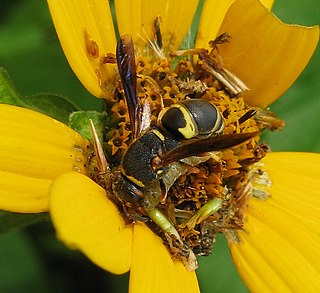
Potter wasps, the Eumeninae, are a cosmopolitan wasp group presently treated as a subfamily of Vespidae, but sometimes recognized in the past as a separate family, Eumenidae.

Parazumia is a Neotropical and Nearctic genus of medium to large sized potter wasps. The Nearctic species of this genus have been treated for much of the 20th century as a separate genus named Paranortonia.
Pachodynerus is a fairly large neotropical and nearctic genus of potter wasps with higher diversity in central South America. At least one species has been introduced in other biogeographical regions, including several oceanic islands, while Pachodynerus erynnis occurs on Ascension Island as well as in North America. This genus is most closely related to the genus Euodynerus.

Delta is an Old World genus of potter wasps with species predominantly distributed through tropical Africa and Asia. Some species are present in the Palearctic region, and a few have been introduced in the Nearctic and Neotropical regions. The members of this genus have a long metasomal petiole, like members of the genera Eumenes and Zeta.

Symmorphus is a primarily holarctic genus of potter wasps.within the family Vespidae.
Knemodynerus is a genus of potter wasps distributed through the Palearctic, Afrotropical, Indomalayan and Australasian regions. The species currently classified in the genus are:
Leptomenes is a mainly Afrotropical genus of potter wasps. It was previously a much larger genus, though many species have been transferred to other genera such as Eumenidiopsis, Stroudia, and Tachymenes.

Monobia quadridens, also known as the four-toothed mason wasp, is a species of solitary potter wasp found in North America. It grows to a wingspan of 18 mm (0.71 in), and feeds on small caterpillars and pollen. Two generations occur per year, with one generation overwintering as pupae.
Eustenancistrocerus is an Afrotropical, Palearctic and Oriental genus of potter wasps. The species in this genus include:
Ischnogasteroides is an Afrotropical and Palearctic genus of potter wasps. It currently includes the following species:
Paravespa is an Afrotropical and Palearctic genus of potter wasps.
Xanthodynerus is a genus of potter wasps known from the Afrotropical and Palearctic regions. It may be synonymous with Euodynerus.
Gymnomerus is a monotypic Palearctic genus of potter wasps. The sole species is Gymnomerus laevipes.
Labus is an Indomalayan genus of potter wasps. It contains the following species:
Paralionotulus is a monotypic Palearctic genus of potter wasps, the sole species being Paralionotulus mervensis which was originally described in 1887 by the Polish entomologist Oktawiusz Radoszkowski as Leptochilus mervensis.
Pseudoleptochilus is a small Palearctic genus of potter wasps consisting of two species.
Pseudosymmorphus is a small Palearctic genus of potter wasps from North Africa and the Middle East, containing four species.
Xenorhynchium is a monotypic Indomalayan genus of potter wasps. The sole species is Xenorhynchium nitidulum.

Euodynerus hidalgo is a species of potter wasp in the family Vespidae. It is distributed in North America.










